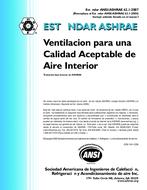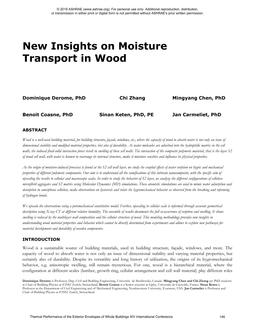Evaluates the applicability of a humidity-controlled house ventilation system in a cold climate. The ventilation system consists of continuously running “mechanical” air extractor units and “passive” air inlet units equipped with humidity sensors. The results of monitoring two such houses showed that changes in the relative humidity (RH) did not appear to track the levels of normal human activity accurately. The difference in air inflow through each passive air inlet due to changes in relative humidity (2% to 10%) varied from 0.8 L/s (1.7 cfm) to a maximum of 1.7 L/s (3.5 cfm), which was found to be insufficient based on high carbon dioxide (CO 2 ) levels (more than 1.200ppm) in occupied rooms. The air inlets responded quickly to sudden large changes in occupancy by opening; however, the net change in fresh air inflow was insufficient. The humidity-controlled mechanical exhaust system was found satisfactory in maintaining the level of exhaust flow with the changes in relative humidity. The air inflow and outflow analyses showed that air leakage through the house envelope remained the predominant form of fresh air supply to the house, thus defeating the purpose of demand-controlled ventilation. The energy consumption of these two houses was reduced by more than 8% by cutting the fresh air provided to the house during unoccupied periods. The results of air quality monitoring (particularly CO 2 ) in both houses, however, raised questions about the suitability of humidity sensing as an exclusive demand-control strategy for ventilation.
KEYWORDS: performance, relative humidity, ventilation, housing, calculating, mechanical ventilation, air inlets, humidity, controls, monitoring, air flow, flow rate, air change rate, carbon dioxide, rooms, occupancy, supply air, leaking, demand controlled ventilation, cold regions
Citation: Symposium, ASHRAE Trans. 1994, Vol.100, Part 2
Product Details
- Published:
- 1994
- File Size:
- 1 file , 1000 KB
- Product Code(s):
- D-17702


